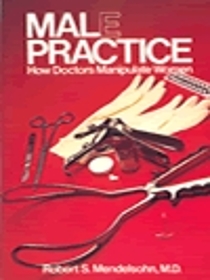Helpful Score: 1
If you are a woman, are post-menopausal or are pregnant, you may have heard or will hear one or more of these phrases from a doctor. "Trust me." "I'm going to order a few simple tests." "Let's just take a couple of pictures." "I'm afraid we'll have to operate." "What do you need a uterus for anyway?" "Do you want your baby to die?" "It's time to speed things up a bit." "Your pelvis is too small." "You'll just have to learn to live with it." "It's safer than pregnancy." "It's you your husband loves, not your breasts." And I saved the best for last: "What medical school did you go to?"
Stephanie M. (QuiltedKnitter) -
While quite an old book, some of the issues that Dr. Mendelsohn raises are still issues today. If you get nothing else from this book, you will learn to ASK the RIGHT questions before agreeing to non-emergency care as many procedures that doctors say are 'simple' or 'routine' can actually cause you illness and injury. Some procedures are pushed because they are moneymakers for either the doctor or the hospital, not because they are in the best interests of the patient such as c-section and hysterectomies. Some procedures are done because "medical students are taught to absorb doctrine...not question it.
Learn how to be more forthright with your doctor. I've had plenty of experience with doctors who hem and haw and won't answer my questions, probably because they don't know the answer themselves. Learn to question unexpected results from lab tests. Not only do labs make errors frequently, but certain conditions, foods, beverages, supplements and drugs can effect the accuracy or effectiveness of a test.
"What are you looking for and if you find it, is it something you can treat?"
"If I do this test, what choices will I have if it is positive? What if it is negative?"
"How effective is this drug on my condition?"
As someone who has had long term health problems resulting from a drug that had ALREADY BEEN FOUND to be ineffective for my condition, I wish I would have read this book long ago.
Finally, I do not agree with everything that is discussed in this book. Some of the information is outdated. Sadly, however, many of the poor practice methods continue to be popular with doctors who don't have to live with the results. To continue these practices, they have now resorted to scare tactics, making it difficult for a patient to have any trust in the medical community at all, given that the practices are so widespread.
Learn how to be more forthright with your doctor. I've had plenty of experience with doctors who hem and haw and won't answer my questions, probably because they don't know the answer themselves. Learn to question unexpected results from lab tests. Not only do labs make errors frequently, but certain conditions, foods, beverages, supplements and drugs can effect the accuracy or effectiveness of a test.
"What are you looking for and if you find it, is it something you can treat?"
"If I do this test, what choices will I have if it is positive? What if it is negative?"
"How effective is this drug on my condition?"
As someone who has had long term health problems resulting from a drug that had ALREADY BEEN FOUND to be ineffective for my condition, I wish I would have read this book long ago.
Finally, I do not agree with everything that is discussed in this book. Some of the information is outdated. Sadly, however, many of the poor practice methods continue to be popular with doctors who don't have to live with the results. To continue these practices, they have now resorted to scare tactics, making it difficult for a patient to have any trust in the medical community at all, given that the practices are so widespread.




